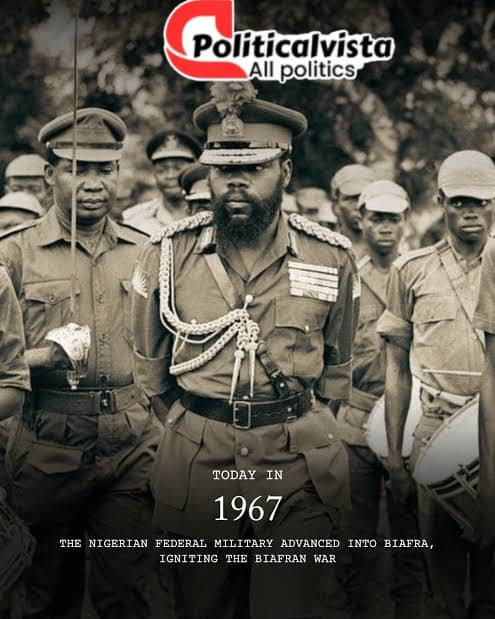
Today, July 6, marks a somber anniversary in Nigeria’s history – the outbreak of the Biafran War in 1967.
This brutal conflict, which lasted for nearly three years, resulted in the loss of an estimated 3.5 million lives, with the Igbo people bearing the brunt of the devastation.
Background to the Conflict
The roots of the conflict can be traced back to Nigeria’s independence in 1960, when ethnic tensions and power struggles began to simmer. A group of young military officers attempted to overthrow the government, citing corruption and mismanagement. However, their actions were perceived differently across regions, fueling further tensions.
The Coup and its Aftermath
The coup led to the takeover by Aguiyi Ironsi, an Igbo military officer. Rumors spread that Igbos planned to dominate the country, leading to increased tensions and violence against Igbos in Northern Nigeria. Ironsi’s efforts to debunk these rumors were insufficient, and his eventual overthrow led to General Yakubu Gowon taking power. Gowon’s government failed to stop the killings of Igbos, exacerbating the situation.
The Aburi Accord
In January 1967, a meeting was held in Aburi, Ghana, between Lieutenant Colonel Odumegwu Ojukwu and General Gowon. The Aburi Accord aimed to address Nigeria’s political crisis, but Gowon reneged on the agreement, introducing Decree 8, which watered down key provisions. Ojukwu saw this as a betrayal, heightening tensions between the Eastern Region and the federal government.
Declaration of Biafra
Given the circumstances, Ojukwu declared the state of Biafra on May 30, 1967. The declaration was a culmination of years of marginalization, violence, and failed agreements. As Ojukwu said, “Since oppression is maintained by force, it is only possible to remove that oppression by a counterforce.”
The War and the Food Blockade
The Nigerian government launched a military campaign against Biafra, marked by widespread atrocities, including massacres, rape, and deliberate bombing of civilians. The food blockade imposed by the Nigerian government, suggested by Chief Obafemi Awolowo, led to severe famine and starvation. Awolowo’s statement, “All is fair in war, and starvation is one of the weapons of war. I don’t see why we should feed our enemies fat, only to fight us harder,” highlights the deliberate use of famine as a war tactic.
Humanitarian Crisis
The war resulted in one of the worst humanitarian crises in modern African history, with images of starving Biafran children flooding global media. The International Committee of the Red Cross struggled to provide aid due to the Nigerian government’s suspicion and obstruction.
Legacy of the War
The Biafran War has left deep-seated grievances and trauma among the Igbo people, contributing to ongoing agitations for self-determination and marginalization. Ebuka Obi-Uchendu aptly noted, “True healing and recovery only come from addressing, not avoiding history.” Understanding the complexities of Nigeria’s past is crucial for building a more united and equitable society.
Key Figures Involved
• General Yakubu Gowon: Head of State of Nigeria during the Biafran War
• Lieutenant Colonel Odumegwu Ojukwu: Leader of the secessionist state of Biafra
• Chief Obafemi Awolowo: Suggested the food blockade as a war tactic
•General Murtala Ramat Muhammed: Played a significant role in the Nigerian military’s efforts against Biafra
• General Benjamin Adekunle: Commanded the 3rd Marine Commando Division and was involved in key military operations
•General Olusegun Obasanjo: Played a key role in the Nigerian government’s military efforts against Biafra.

Be the first to comment